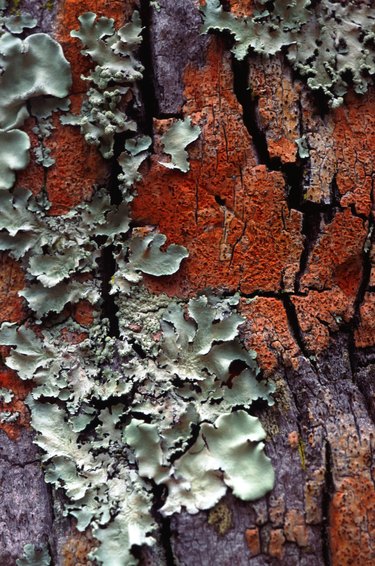Things You'll Need
Shade cloth
Rope
String
Water
Bucket
Soft scrub brush or pad

Lichens are composed of a fungus and an alga living together cooperatively. They generally don't harm the plant they grow on, since they make their own food from sunlight, water and air. Many people enjoy the color and patterns lichens create. However, they can decrease the ornamental value of the plant they're growing on and can obscure features like colored or ornamental bark. If lichens are so plentiful they cover the plant, they can interfere with the plant's intake and outgo of oxygen and carbon dioxide. Usually lichens grow on plants with more exposed stems where lichens get the sunlight they need, so their presence may indicate thinning leaves and branches due to disease or other problems.
Step 1
Call in a Cooperative Extension Agent or a Master Gardener to help identify any health problems of the plants that have lichen growth on branches or bark.
Video of the Day
Step 2
Carry out suggested measures to increase plant health that would lead to increased canopy shade, which would result in decreased lichen growth.
Step 3
Put shade cloth over affected branches or trees to temporarily create shade. Cut shade cloth to fit individual azalea branches or tree trunks. Tie the shade cloth down with rope or string if necessary. Lichens will eventually die without sufficient sunlight.
Step 4
Remove lichen physically. Moisten the affected area with water, or wait until after a soaking rain.
Step 5
Gently rub affected areas with a soft scrubbing brush or pad. Rinse the brush or pad frequently in a bucket of water. Empty the bucket and refill it with clean water as needed.
Warning
Rub softly on ornamental bark surfaces so the surface is not damaged and on azalea branches, which are brittle.
Video of the Day